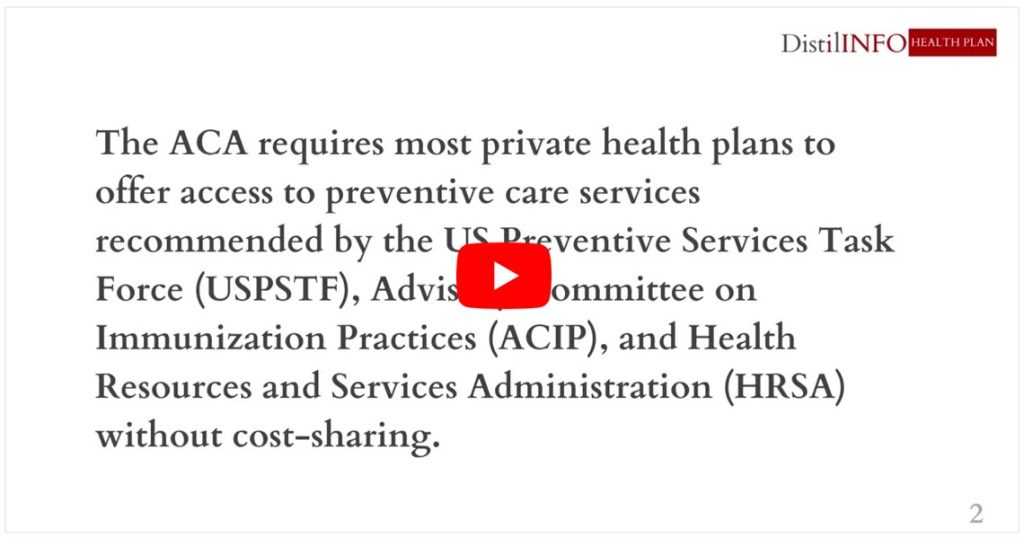
The preventive care coverage requirement under the Affordable Care Act (ACA) helped improve no-cost access to care, including cancer screenings, vaccines, and contraceptive care, according to an Urban Institute brief.
The ACA requires most private health plans to offer access to preventive care services recommended by the US Preventive Services Task Force (USPSTF), Advisory Committee on Immunization Practices (ACIP), and Health Resources and Services Administration (HRSA) without cost-sharing.

However, a lawsuit against HHS in the Northern District of Texas may threaten this access. In Kelley v. Becerra, plaintiffs argued that the preventive services requirement is unconstitutional because Congress did not provide sufficient direction to HHS regarding what should be covered.
In addition, they claimed the requirement is unconstitutional because members of USPSTF, ACIP, and HRSA are not nominated by the president and confirmed by the Senate.
The ACA regulation has helped increase access to affordable preventive care for millions of Americans.
For example, 35.3 million children are enrolled in ACA-compliant private health plans. These children have access to free well-baby and well-child visits, 14 recommended immunizations, over 20 screenings, oral health assessments, fluoride treatment, and medications to prevent pregnancy and HIV.

Nearly 70 million adult women can access free well-woman visits; 14 recommended vaccinations; 11 prenatal screenings; screening and counseling for chronic conditions, cancers, and risk factors; and preventive medications such as birth control, aspirin, and PrEP.
Almost 65 million adult men also receive access to preventive care services under this regulation.
If cost-sharing is required for preventive care, individuals may choose to go without it, leading to serious health issues.
Since the ACA requirement took effect in 2010, there have been increases in colorectal cancer screenings, cholesterol screenings, blood pressure screenings, HPV vaccines, and flu vaccines, the brief stated.
Additionally, the provision has helped facilitate access to reproductive healthcare services. Since 2011, contraception use has increased, including the use of intrauterine devices (IUDs). Between 2010 and 2013, women saved an average of $255 on oral contraception and $248 on IUDs annually.
There was also a decline in unintended pregnancy after the ACA implemented its contraceptive coverage, researchers found.
The preventive care coverage requirement also helps maintain access to PrEP for people at high risk for HIV. Insurers were required to cover PrEP without cost-sharing for this population starting in 2021.
Ensuring free access to PrEP may also help address health equity, as the high cost of the medication often leads to underuse among Black and Hispanic adults, the brief noted.
The ACA requirement to cover preventive care is popular among more than half of Americans, with 62 percent saying in 2019 that it was very important the requirement stays in place.

“If the ACA’s preventive services provision is overturned, private health plans will be able to charge cost sharing for these life-saving services,” researchers wrote. “Though not all health plans will elect to impose cost sharing for all services, many plans did not cover or required cost sharing for many preventive services before the ACA.”
For example, the nongroup market frequently excluded coverage for prenatal care, maternity care, and other healthcare services for women. If Kelley v. Becerra overturns the preventive care requirement, nongroup and small group plans may reduce coverage, reintroduce cost-sharing, or eliminate preventive coverage over time, the brief noted.
“The ACA’s free preventive services requirement has increased access to care, reduced out-of-pocket spending, and helped millions of Americans improve or maintain their health,” the brief concluded. “Overturning this requirement could have far-reaching consequences for the 167.5 million Americans who rely on private health insurance.”
Source: HealthPayer Intelligence


